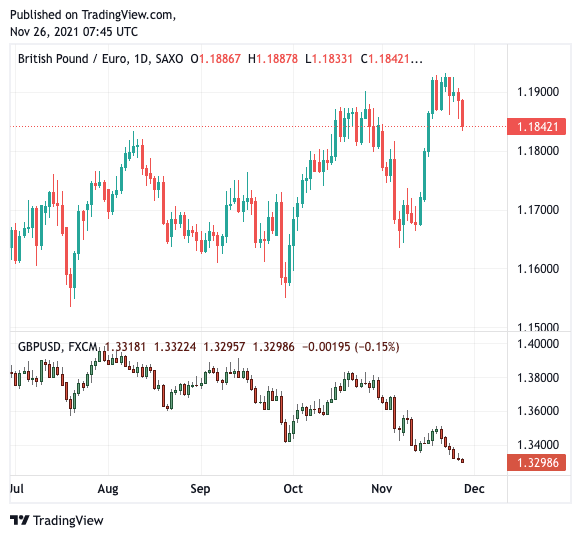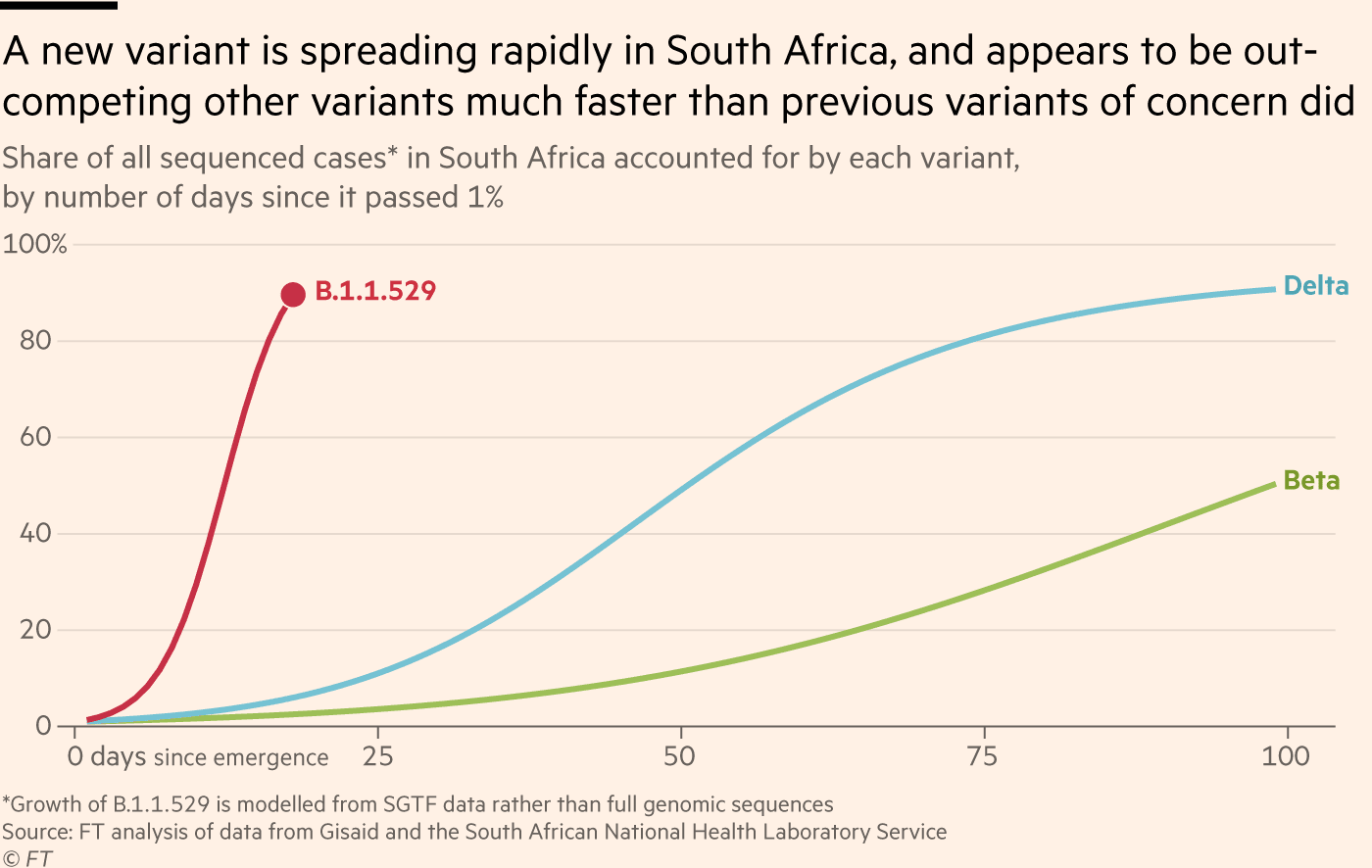Omicron Variant: Risk Off Drives Pound Lower against Euro and Dollar
- Written by: Gary Howes

Image © Adobe Images
A significant 'risk off' move on global markets and an associated fading of Bank of England interest rate hike expectations saw the British Pound fall against the Euro and Dollar ahead of the weekend, but rise against its more risk sensitive peers.
Markets were sold amidst fears that the newly discovered Omicron variant could escape vaccines and prove more transmissible than the currently dominant Delta variant.
The Dollar, Yen and Franc were bought while the Australian Dollar, Rand, Emerging Market Currencies and other 'high yielders' were sold.
"The emergence of a new COVID-19 variant has already triggered fresh purchases of the JPY and CHF that may also help steer the USD strength for today, while penalising AUD, NZD and CAD," says Roberto Mialich, a foreign exchange strategist at UniCredit.
The Pound to Dollar exchange rate is near multi-week lows and threatens to go below 1.33.
Above: Daily price chart for GBP/EUR (top) and GBP/USD (bottom).
- Reference rates at publication:
GBP/EUR: 1.1850 \ GBP/USD: 1.3298 - High street bank rates (indicative): 1.1618 \ 1.3026
- Payment specialist rates (indicative: 1.1790 \ 1.3232
- Find out about specialist rates, here
- Set up an exchange rate alert, here
- Book your ideal rate, here
In the middle of this risk-on / risk-off battle sits the Pound: losing against the safe havens but advancing against its riskier counterparts.
The Euro is meanwhile favoured above Sterling in the safe haven stakes, explaining why the Pound to Euro exchange rate has retreated back from the 1.19 level into the mid-1.18s.
The reaction suggests we are entering something of a binary period for FX where local drivers no longer matter as investor focus turns to the bigger global picture.
"The negative sentiment is likely caused by the spike in mutated Coronavirus variant in South Africa. FX and fixed income markets are also reflecting a more cautious mood," says analyst Kjersti Haugland at DNB Markets.
Keen virus watchers would have watched news out of South Africa with alarm on Thursday, but it was only on Thursday night when the UK instituted a travel ban on the country and five other African states did the investor community sit up and take notice.
By the end of Friday the United States, European Union and other major Asian countries had implemented a similar ban.
The new B.1.1.529 variant, known as Omicron, appears more transmissible than Delta with an R-rate of 2 and there are concerns it evades the antibodies created by previous infections and potentially vaccines.
"Based on the data we have, this variant is out-competing others far faster than Beta and even Delta did," says John Burn-Murdoch, a statistical analyst at the Financial Times.
Image courtesy of the FT. Sourced: @jburnmurdoch
An R-rate of 2 means every infected individual passes it on to two others.
South Africa's Department of Health flagged the importance of the Nu variant in a press briefing held alongside scientists from the Network for Genomic Surveillance in South Africa.
"This variant ... surprised us ... it has a big jump on evolution," said Professor Tulio de Oliveira, director of the KwaZulu-Natal Research Innovation and Sequencing Platform (Krisp), the country's leading genomic sequencing institute.
"Many of the mutations are of concern for immune evasion and transmissibility. We can see the variant potentially spreading very fast… We do expect, unfortunately, to start seeing pressure in the healthcare system in the next few days and weeks," he added.
Markets will over coming days keep a close watch on the research rapidly being conducted on the Nu variant, to understand how vaccines and prior infections prevent infection and the onset of serious illness.
Bad news on this front could exacerbate fears that the world is heading towards what could be described as a second cycle of the Covid-19 pandemic.
The Pound fell to near-all time lows against the Euro in early 2020 when the first cycle of the pandemic commenced and a worst case scenario would therefore deliver significant losses for the UK currency against the safe havens.
But, gains against the Australian, Canadian and New Zealand Dollars and Emerging Market currencies would be expected.
{wbamp-hide start}
{wbamp-hide end}{wbamp-show start}{wbamp-show end}
A more benign scenario would be in which vaccines and previous infections are confirmed as offering strong protection against Nu.
This would likely see risk return to markets and currencies return to levels seen on Thursday, November 25.
The emergence of the variant will pose questions to those central banks looking to raise interest rates in the near future, particularly the Bank of England which could hike either in December or February.
"Classic risk-off playbook in FX," says Viraj Patel, FX & Global Macro Strategist at Vanda Research. "Central banks were looking for an excuse to hold back on tightening and they may have got it with the 'Nu' variant uncertainty."
Should expectations for a December rate hike recede further then the Pound could unwind recent gains; indeed this does look to be already underway.
The Bank had been tipped to raise rates in light of surging inflation but fears that a new variant will hit growth would likely see inflationary fears trumped by concerns for economic growth.
"This gives the Bank of England cover not to go ahead with a rate rise next month, assuming this doesn't blow over," says Michael Hewson, Chief Market Analyst at CMC Markets.
Samuel Tombs, Chief UK Economist at Pantheon Macroeconomics, says UK interest rate expectations have declined today in response to the news of the Nu variant.
He says markets now see a 63% chance of a December rate hike, down from 93% a week ago.







